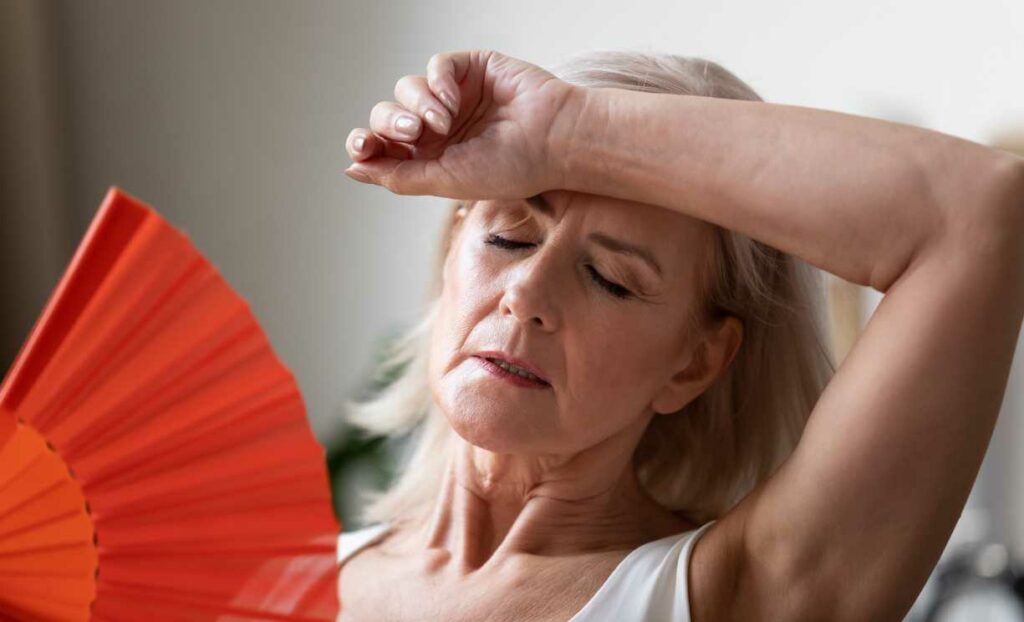Menopause is a natural biological process marking the end of a woman’s reproductive years. As the body undergoes hormonal changes, a range of symptoms can arise, impacting daily life and well-being. In this blog, we will explore common menopause symptoms, shedding light on ways to navigate this transformative phase with grace and understanding.
Contents
Understanding Menopause
Menopause is a natural phase in a woman’s life that typically occurs around the age of 50, though it can vary. It marks the end of the reproductive years, and during this time, the body undergoes hormonal changes. The most significant change is a decline in estrogen and progesterone, two hormones essential for the menstrual cycle and fertility.
One of the hallmark signs of menopause is the cessation of menstruation. Women may notice irregular periods before eventually experiencing a complete stop in their menstrual cycles. Alongside this, various symptoms may arise due to hormonal fluctuations, and these can affect different aspects of daily life.
While menopause brings challenges, it is a natural and transformative phase. Understanding these changes, seeking support from healthcare professionals, and adopting a healthy lifestyle can significantly ease the transition. Women navigating menopause can find empowerment through knowledge and self-care, ultimately embracing this new chapter in their lives.
What Are The Stages Of Menopause?
Menopause is a gradual process that occurs in stages, signifying the natural transition from a woman’s reproductive years to the post-reproductive phase. The stages of menopause are typically divided into three main phases: perimenopause, menopause, and postmenopause.
- Perimenopause: Starting in a woman’s 40s, perimenopause is marked by hormonal fluctuations and irregular periods. Symptoms like hot flashes and mood swings are common during this phase, which can last several years. It concludes when a woman has gone 12 months without a period.
- Menopause: Officially declared when there’s a year without menstruation, typically around age 51, menopause sees a cessation of egg release, and hormonal fluctuations stabilize. Symptoms like hot flashes may persist but often diminish in intensity.
- Postmenopause: Beginning after menopause is confirmed, postmenopause spans the rest of a woman’s life. Symptoms tend to diminish, but health management remains crucial. Regular check-ups and a healthy lifestyle contribute to a positive postmenopausal phase.
Symptoms Of Menopause
Menopause is a natural biological process that marks the end of a woman’s reproductive years. It can occur between the ages of 40-58. It is characterized by a decline in reproductive hormones leading to a range of symptoms. Here are common symptoms of menopause:
- Hot Flashes and Night Sweats: Menopause often brings about sudden, feelings of heat known as hot flashes. These can occur during the day or disrupt sleep as night sweats, leading to discomfort and sleep disturbances.
- Irregular Menstrual Cycles: As menopause approaches, menstrual cycles become irregular, with periods becoming lighter or heavier, more frequent, or less predictable. Eventually, menstruation ceases altogether.
- Mood Swings and Emotional Changes: Hormonal fluctuations during menopause can impact mood, leading to mood swings, irritability, anxiety, and even depression. Emotional support and open communication become vital during this time.
- Sleep Disturbances: Changes in hormone levels can contribute to difficulties falling asleep or staying asleep. Addressing sleep hygiene, establishing a bedtime routine, and seeking professional advice if needed can help manage sleep disturbances.
- Vaginal Dryness and Discomfort: A decrease in estrogen levels can lead to vaginal dryness and discomfort during intercourse. Lubricants or moisturizers can provide relief, and discussing concerns with a healthcare provider is essential.
- Weight Gain and Metabolic Changes: Changes in metabolism and hormonal imbalances may contribute to weight gain. Adopting a healthy lifestyle with regular exercise and a balanced diet can help manage weight during menopause.
- Joint Pain and Muscle Aches: Menopause can be accompanied by joint pain and muscle aches. Staying physically active, maintaining a healthy weight, and incorporating gentle exercises like yoga can alleviate these symptoms.
- Changes in Hair and Skin: Hormonal shifts can affect the texture and condition of hair and skin. Adequate hydration, a nourishing skincare routine, and consulting with a dermatologist can help address these changes.
Common Complications Due To Menopause
Menopause is a natural phase in a woman’s life, but it can bring about various changes and potential complications. While not all women will experience these complications, some common issues associated with menopause include:
- Osteoporosis: The decline in estrogen during menopause can lead to decreased bone density, increasing the risk of osteoporosis. This condition makes bones more susceptible to fractures.
- Cardiovascular Disease: The risk of cardiovascular disease increases after menopause. Estrogen has protective effects on the cardiovascular system, and its decline may contribute to higher blood pressure and cholesterol levels.
- Urinary Incontinence: Changes in pelvic floor muscles and tissues can lead to urinary incontinence. Hormonal shifts during menopause may contribute to a weakening of these structures.
- Vaginal Atrophy: The decline in estrogen levels can result in thinning, drying, and inflammation of the vaginal walls, known as vaginal atrophy. This can lead to discomfort during intercourse and an increased risk of infection.
- Increased Cholesterol Levels: Changes in hormonal levels can impact lipid metabolism, leading to an increase in cholesterol levels. Elevated cholesterol is a risk factor for cardiovascular disease.
Treatments For Menopause Symptoms
There are various treatments and approaches to manage the symptoms associated with menopause. It’s important to note that the effectiveness of these treatments can vary among individuals, and healthcare providers often tailor recommendations based on individual health and preferences. Here are common treatments for menopause symptoms:
- Hormone Replacement Therapy (HRT): HRT involves the use of estrogen and sometimes progesterone to replace hormones that decline during menopause. It can effectively alleviate symptoms such as hot flashes, night sweats, and vaginal dryness. However, it’s not suitable for everyone, and risks and benefits should be carefully considered.
- Non-Hormonal Medications: Certain medications not containing hormones may be prescribed to manage specific symptoms. For example, selective serotonin reuptake inhibitors (SSRIs) or serotonin-norepinephrine reuptake inhibitors (SNRIs) are sometimes used to address mood swings and hot flashes.
- Vaginal Estrogen Therapy: For women experiencing vaginal dryness and discomfort during intercourse, localized estrogen therapy in the form of creams, rings, or tablets can help restore vaginal health.
- Dietary Supplements: Some women find relief from symptoms through dietary supplements. For example, calcium and vitamin D supplements can support bone health, and herbal supplements like black cohosh may help manage hot flashes. However, the efficacy of these supplements varies, and it’s crucial to consult with a healthcare provider before using them.
- Counseling and Support: Talking to a counselor or therapist can be beneficial for managing emotional symptoms such as mood swings, anxiety, or depression. Support groups also provide a platform for sharing experiences and coping strategies.
- Cooling Techniques for Hot Flashes: Simple strategies like dressing in layers, staying hydrated, and using cooling fans can help manage hot flashes.
- Prescription Medications for Bone Health: To address the increased risk of osteoporosis, healthcare providers may prescribe medications to support bone density.





